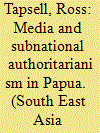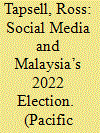| Srl | Item |
| 1 |
ID:
141739


|
|
|
|
|
| Summary/Abstract |
This article examines the hindrances to journalists' autonomy in the Papua provinces of Indonesia. It argues that media practitioners in Papua are operating in a subnational authoritarian environment, where the freedoms enjoyed by journalists elsewhere in Indonesia's largely robust media are not afforded to local journalists. The article explains that security forces and local government are the main factors influencing mainstream news content in the region. Yet, as Internet penetration rises and new communication technologies are advanced, new online journalism ventures are gaining in prominence. Their success will depend on whether subnational authoritarianism remains the status quo in a region where new local media ventures are largely unable to provide open and critical coverage of events and issues.
|
|
|
|
|
|
|
|
|
|
|
|
|
|
|
|
| 2 |
ID:
193628


|
|
|
|
|
| Summary/Abstract |
This article argues that Malaysia’s 2022 General Election (GE15) amplified negative campaigning via new techniques associated with platform and technological advancements, led by creative innovations in campaign tactics, including livestreaming and video content. GE15 was the freest election campaign in Malaysia’s history. All political parties and coalitions enjoyed access to a wide range of mainstream and online media to disseminate content, and new platforms like TikTok emerged as influential conduits of campaign messages. Yet serious problems in this digital public sphere remain a feature of the country’s media landscape. These include cybertroopers, fake news peddlers, and those creating polarizing content around race and religious issues. This article explains how social media campaigning in Malaysia is becoming more professionalized and better resourced, inspiring some diversity and creativity, while at the same time enabling groups who spread narratives intended to incite and enrage, particularly via video content. The Malaysian case exemplifies the growing problems within the contemporary digital public sphere, showing how the professionalization of social media campaigning can lead to disinformation and, ultimately, polarization.
|
|
|
|
|
|
|
|
|
|
|
|
|
|
|
|